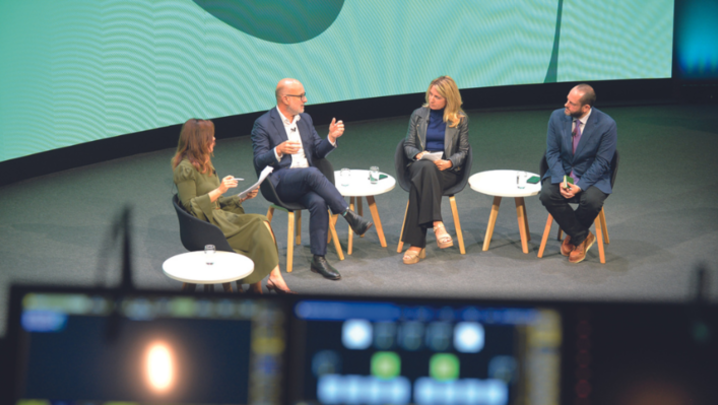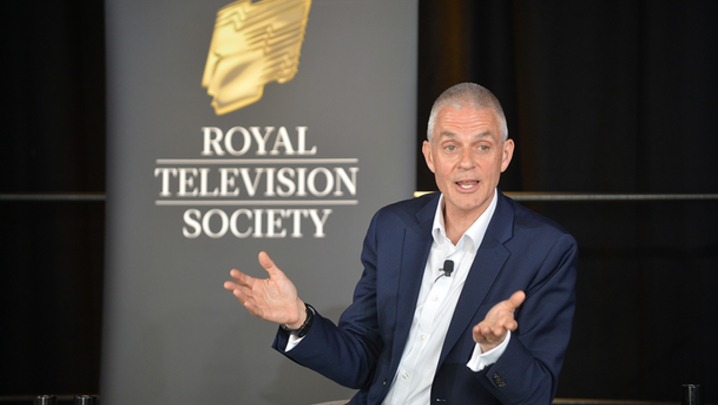Tim Davie’s success in poaching Deborah Turness from ITN signals big changes for one of the world’s most trusted news brands, reports Steve Clarke.
You could almost feel jaws dropping when it was announced last month that the pioneering Deborah Turness had been appointed the new head of BBC News. Turness, 54, had only recently got her feet under the table as ITN’s third CEO in as many years. Why would she give up this plum position – ideally suited to her skills at the company where she originally made her name – to take on the multiple challenges of running BBC News?
“The job is a poisoned chalice,” says one UK news chief. “But she survived and thrived at NBC, so I suspect she feels she can take in her stride everything that the BBC can throw at her.”
Certainly, Turness brings an extraordinary level of experience across the editorial, strategy and commercial fields to a job that many people thought would go to an insider. “She’s very talented. You can see the attraction for [Director-General] Tim Davie in that she doesn’t have the baggage that the internal candidates had,” observes a senior broadcaster.
Turness began her career as a freelancer at ITN after studying journalism at the University of Bordeaux – her French is impeccable and is said to have landed her several scoops at ITN.
“This is a very Tim Davie appointment,” suggests a former colleague of Turness. “She’s been hired to shake up BBC News, which, despite its deserved global reputation for being accurate and impartial, is at times guilty of being a bit dull.”
It is understood that she was initially reluctant to be considered a candidate for leading BBC News. And only after Davie expanded the role to embrace “the vision stuff”, and changed the job title to CEO, did she become interested in the role.
The thinking appears to be that, under Turness’s leadership, the BBC’s news operation will run below her, leaving her free to focus more on business, development, product, commercial, consumer and innovation. Intriguingly, there is speculation inside the corporation about how Davie wants to strengthen its international reputation for trusted, impartial news and perhaps even make some money from it – which would, admittedly, be a difficult task.
In a digital era driven by social media, rolling news channels are looking less than cutting-edge. And, with the BBC facing a black hole in its finances due to the two-year freeze in the licence fee, any new sources of revenue are likely to be seized upon.
‘She’s a fireball of energy and creativity’
In this respect, Turness’s international experience and commercial expertise – she was in charge of her own department’s ad revenue when she was President of NBC News – could prove hugely useful to Davie’s modernisation strategy.
She was the first woman and first non-American to run NBC News when she was hired in 2013, after spending the best part of 25 years at ITN. There, she was the first female editor of ITV News, which won three consecutive Baftas and an International Emmy on her watch.
Those who have worked alongside her praise her dynamism. “Deborah Turness was my boss when I first joined ITN in 2006. A fireball of energy and creativity, she would come to the morning newsroom meeting to discuss the day’s agenda armed with newspaper clippings and full of ideas about how to make ITV’s news coverage stand out,” recalls Charlotte Grant, now a consultant after working at ITV News, Channel 5 and Sky News.
She continues: “Deborah was always driving home the message that ITN may be up against much bigger news beasts with more resources, but, as a smaller operation, we could succeed by being nimble, thinking outside the box and, ultimately, telling the day’s stories in the most compelling and engaging way for viewers.”
Her success at ITN caught the eye of NBC. At ITN, she was on the team that launched the mould-breaking Channel 5 News, presented by Kirsty Young. The show did away with the traditional desk, leaving news anchors free to roam the studio floor, and Turness nurtured the careers of ITV News presenters such as Mark Austin and Julie Etchingham.
At NBC, the news division was embroiled in several high-profile scandals, including that of nightly news anchor Brian Williams, who was revealed to have exaggerated his Iraq war reporting.
Meanwhile, many old hands at NBC News resented this charismatic Brit, who was determined to turn around ailing shows such as Today and Meet the Press. “From the moment she arrived, people were looking for her to fail,” says a senior broadcaster. A former colleague recalls: “Deborah was a ball of energy, and there were parts of NBC that had an allergic reaction to it. The Brian Williams crisis didn’t help, although it was nothing to do with her.”
She did, however, make the decision to suspend the nightly news anchor rather than fire him — a move that angered NBC News staffers.
Of her experience running NBC News, she told Television in 2019: “I was brought in as someone to look and see what needed to be done to put things right. And everything was number one before I left. I was extremely happy and proud of what I had achieved. I’d always seen it as a project.”
'BBC News’s importance as a trusted, impartial service has never been greater'
Stewart Purvis, who was Turness’s boss at ITN, emphasises that her legacy at NBC was an impressive one: “I think you will find that every show she was responsible for was regularly top of the ratings in its class.”
When Turness was moved sideways at the company, relocating from New York to Lyons and overseeing the revamping of Euronews as President of NBC International, she spent several months preparing to launch an NBC Sky World News channel.
She had hired a full team and the idea was to be the world’s most transparent news brand and disrupt traditional news models by showing how journalists go about their work. But three months out from launch, the pandemic hit and Comcast, worried by advertising falling off a cliff, pulled the plug.
Expect this keenness to show the workings of news – evident in Ros Atkins’s Outside Source programme on the BBC News Channel and in his “explainer videos” – to become more commonplace in mainstream BBC news outlets under Turness’s leadership. His reports contain a lot of context and background, elements not always to the fore in, say, BBC News at Ten.
They have gone viral and been labelled “assertive impartiality” for their more colloquial approach to reporting the news. If adopted in prime time, this experimental and innovative approach could well encourage more young people to get the BBC News habit.
Turness has also told friends of her admiration for the BBC disinformation correspondent, Marianna Spring, who made such an impression at the RTS’s Cambridge Convention last September.
Turness has spoken publicly of her liking for the BBC Africa Eye open source reports, praised for their transparent approach to their investigations and popular on social media.
However, for many, the BBC’s flagship news broadcasts and programmes, such as Today and Newsnight, remain the acid test of the corporation’s journalism. One question being asked inside New Broadcasting House is whether Newsnight will be axed, especially as some think the programme is losing its mojo after editor Esmé Wren’s departure for Channel 4 News.
Davie has made much of his desire to ensure that the BBC delivers value to every UK household. How it covers news across the length and breadth of Britain is essential to making good on this promise, especially now that ITV News is launching a new, hour-long, early-evening programme determined to provide a greater focus on stories outside London.
Turness is a legendary networker and her people skills are second to none. These are likely to be handy in the BBC’s often fraught relations with government and prickly politicians on both sides of the Commons.
It is said that she even managed to strike up something of a rapport with Donald Trump while at NBC.
One thing is clear: in today’s chaotic, confusing and disrupted world, where people are bombarded with contradictory information and can find it difficult to access trustworthy news, BBC News’s importance as a trusted, impartial service has never been greater.
If Turness’s eventual legacy at the BBC is to enhance that trust, Davie’s determination to secure her as one of his most important and influential lieutenants will have paid off.






